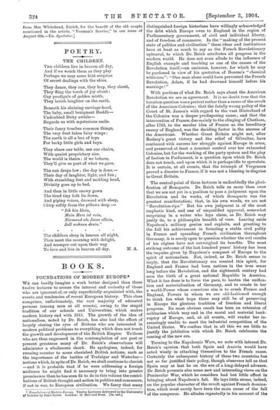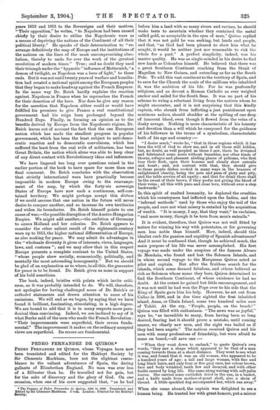BOOKS.
FOUNDATIONS OF MODERN EUROPE.* WE can hardly imagine a work better designed than these twelve lectures to arouse the interest and curiosity of those who are ignorant of, or only superficially acquainted with, the events and tendencies of recent European history. This class comprises, unfortunately, the vast majority of educated persons (among men at all events), owing to the stupid tradition of our schools and Universities, which makes modern history end with 1815. The growth of the idea of nationalism, noted by Dr. Reich, has also had the effect of largely closing the eyes of Britons who are interested in modern political problems to everything which does not touch the growth and development of the British Empire. To those who are thus engrossed in the contemplation of our past or present greatness many of Dr. Reich's observations will administer a wholesome shock. He apologises, indeed, for running counter to some cherished British notions, such as the importance of the battles of Trafalgar and Waterloo— notions which, in spite of Dr. Reich, we shall continue to cherish —and it is probable that if be were addressing a foreign audience he might find it necessary to bring into greater prominence than he has seen fit to do in this volume the contri- butions of British thought and action in politics and commerce, if not in war, to European civilisation. We fancy that many
• Foundations of Modern Europe. Twelve Lectures delivered in the University of London by Emil Reich. London: G. Bell and Sons. 15s. net.]
distinguished foreign historians have willingly acknowledged the debt which Europe owes to England in the region of Parliamentary government, of civil and individual liberty, and of freedom of commerce. In the "making of the present state of politics and civilisation" these ideas and institutions have at least as much to say as the French Revolutionary upheaval, to which Dr. Reich attributes all progress in the modern world. He does not even allude to the influence of English example and teaching as one of the causes of the Revolution itself,—an omission, however, for which he may be pardoned in view of his quotation of Boerne's "classical witticism": "One man alone could have prevented the French Revolution, Adam, if he had drowned himself before his marriage !"
With portions of what Dr. Reich says about the American Revolution we are in agreement. It is no doubt true that the taxation question was a pretext rather than a cause of the revolt of the American Colonies; that the fatally wrong policy of the Court of St. James's with regard to the vast Hinterland of the Colonies was a deeper predisposing cause ; and that the intervention of France, due mainly to the clinging of Chatham, after 1763, to the secular idea of France as the hereditary enemy of England, was the deciding factor in the success of the Americans. Whether Great Britain might not, after Rodney's great victory and the relief of Gibraltar, have continued with success her struggle against Europe in arms, and preserved at least a nominal control over her exhausted Colonies, but for the working of the party system and the play of faction in Parliament, is a question upon which Dr. Reich does not touch, and upon which it is perhaps idle to speculate. It is certain, at all events, that the triumph of Vergennes proved a disaster to France, if it was not a blessing in disguise to Great Britain.
The central point of these lectures is undoubtedly the glori- fication of Bonaparte. Dr. Reich tells us more than once that we are not yet in a position to pass a judgment upon the Revolution and its works, of which Bonaparte was the greatest manifestation; that, in his own words, we are not "Revolution-ripe." But his own judgment is of the most emphatic kind, and one of unqualified approval, somewhat surprising in a writer who lays claim, as Dr. Reich may justly do, to a philosophic breadth of view. Leaving aside Napoleon's military genius and exploits, and granting to the full his achievement in founding a stable civil polity in France and spreading French civilisation throughout Germany, it is surely open to question whether the evil results of his regime have not outweighed its benefits. The most striking outcome of the last hundred years' history has been the impulse given by Napoleon's conquest of Europe to the spirit of nationalism. Not, indeed, as Dr. Reich seems to imply, that the Revolutionary era created this spirit, for England and France had been nations in the true sense long before the Revolution, and the eighteenth century had seen the birth of a great national Republic in America. What it has done is to force the pace, to hasten the unifica- tion and materialisation of Germany, and to create in her a world-Power whose conscious aim is to crush France and England, Powers in whom we are old-fashioned enough to think lies what hope there may still be of preserving in Europe the glorious tradition of freedom and liberal progress. Its most obvious result has been an extension of militarism which may end in the moral and material bank- ruptcy of Europe, and, at all events, will render her in- creasingly unable to meet the industrial competition of the United States. We confess that in all this we see little to justify the jubilation with which Dr. Reich celebrates the coming of the new era.
Turning to the Napoleonic Wars, we note with interest Dr. Reich's opinion that both Spain and Austria would have acted wisely in attaching themselves to the French cause. Certainly the subsequent history of these two countries has not so far justified their policy, though observers tell us that Spain may at last be on the eve of a long-delayed advance. Dr. Reich presents also some new and interesting views on the Peninsular War, which he considers had but little effect in bringing about Napoleon's fall. He lays little stress, indeed, on the popular character of the revolt against French domina- tion, which must surely have been the main cause of the fall of the conqueror. He alludes repeatedly in his account of the
years 1813 and 1815 to the Sovereigns and their motives. "Their opposition," he writes, "to Napoleon had been caused chiefly by their desire to utilise the Napoleonic wars as a means of depriving the nations of the Continent of all their political liberty." He speaks of their determination to "re- arrange definitively the map of Europe and the institutions of the nations on the lines of the most uncompromising abso- lutism, thereby to undo for ever the work of the greatest revolution of modern times." True ; and no doubt they used their triumph under the" hypnotic "influence of Metternich, "a demon of twilight, as Napoleon was a hero of light," to these ends. But it was not until twenty years of warfare and humilia- tion had created a national spirit among the European peoples that they began to make headway against the French Emperor. In the same way Dr. Reich hardly explains the reaction against Napoleon in France when he reproaches the French for their desertion of the hero. Nor does he give any reason for the assertion that Napoleon either could or would have fulfilled his promises to give France a real constitutional government had his reign been prolonged beyond the Hundred Days. Finally, in forming an opinion as to the benefits derived by Europe from the Napoleonic regime, Dr. Reich leaves out of account the fact that the one European nation which has made the steadiest progress in popular government, which has been the least subject to anti-demo- cratic reaction and to democratic convulsions, which has suffered the least from the real evils of militarism, has been Great Britain, the nation which alone was able to keep clear of any direct contact with Revolutionary ideas and influences.
We have lingered too long over questions raised in the earlier portion of the book to have space for more than one final comment. Dr. Reich concludes with the observation that strictly international wars have practically become impossible in modern Europe owing to the rearrange- ment of the map, by which the forty-six sovereign States of Europe have now each a continuous, self-con- tained territory. We might perhaps accept this dictum if we could assume that one nation in the future will never desire to conquer another, and so increase its own territories and widen its boundaries. Dr. Reich himself points to one cause of war,—the possible disruption of the Austro-Hungarian Empire. We might add another,—the ambition of Germany to annex Holland and her colonies. Dr. Reich appears to consider the other salient result of the eighteenth-century wars up to 1815, the higher national differentiation of Europe, as also making for peace. We may admit its advantages in the "wholesale diversity it gives of interests, views, languages, laws, and customs " ; and we may allow that in this respect Europe presents a complete contrast to the -Ignited States, "whose people show socially, economically, politically, and mentally the most astounding homogeneity." But we should be glad of an explanation as to where, in all this, the guarantee for peace is to be found. Dr. Reich gives us none in support of his bold assertions.
The book, indeed, bristles with points which invite criti- cism, as it was probably intended to do. We will, therefore, not apologise for having challenged some of Dr. Reich's ea cathedra statements and drawn attention to some of his omissions. We will end as we began, by saying that we have found it brilliant, fascinating, stimulating, in a high degree. We are bound to add that it is in many respects more para- doxical than convincing. Indeed, we are inclined to say of it what Burke said of the men who made the French Revolution : "Their improvements were superficial, their errors funda- mental." The improvement it makes on the ordinary accepted views are superficial. Its errors are fundamental.







































 Previous page
Previous page